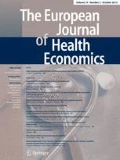Abstract
The cost of medication errors (MEs), and by extension their impact on the running of hospitals, is generally unknown to hospital managers. This study estimated the financial costs involved in the additional use of hospital resources as a result of MEs. For this we used a database covering 20,014 hospital admissions, with clinical and personal information about each patient, the costs related to his/her stay, and physicians’ prescriptions. Analyses were carried out using cases and control techniques to calculate the additional cost of MEs. During the study period, 2001, the analysis indicated that the MEs analyzed caused an additional 303 days of hospital stay, with an overall annual cost of nearly €76,000. Our study confirms that MEs are a costly reality. The presence of MEs doubled the cost per patient.



Similar content being viewed by others
References
Bates DW, Cullen DJ, Laird N, Petersen LA, Small SD, Servi D, Laffel G, Sweitzer BJ, Shea BF, Hallisey R et al. (1995) Incidence of adverse drug events and potential adverse drug events. Implications for prevention. JAMA 274:29–34
Lesar TS, Briceland L, Stein DS (1997) Factors related to errors in medication prescribing. JAMA 277:312–317
Classen DC, Pestotnik SL, Evans RS (1997) Adverse drugs events in hospitalised patients. Excess of length of stay, extra cost and attributable mortality. JAMA 277:301–306
Kohn LT, Corrigan, Donaldson MS (ed) (1999) To err is human: building a safer health system. National Academy: Washington
Phillips J, Beam S, Brinker A, Holquist C, Honig P, Lee LY, Pamer C (2001) Retrospective analysis of mortalities associated with medication errors. Am J Health Syst Pharm 58:1835–1841
Blasco P, Mariño E, Aznar MT, Pol E, Alós M, Castells M, Velasco ML (2001) Desarrollo de un método observacional prospectivo de estudio de Errores de Medicación para su aplicación en hospitales. Farm Hosp 25:253–273
Bates DW, Spell N, Cullen DJ, Burdick E, Laird N, Petersen LA, Small SD, Sweitzer BJ, Leape LL (1997) The costs of adverse drug events in hospitalized patients. JAMA 277:307–311
Lacasa C, Polo C, Andreu C, Roure C, Martínez J, Cot R (1998) Detección de errores de medicación en hospitales. Evaluación de la calidad del proceso de prescripción, dispensación y administración de medicamentos. Rev Calid Asist 13:92–100
Leape L, Brennan T, Laird N et al. (1991) The nature of adverse events in hospitalized patients. Results of the Harvard Medical Practice Study II. N Engl J Med. 324:377–384
Evans RS, Classen DC, Stevens LE et al. (1993) Using a hospital information system to assess the effects of adverse drug events. Proc Annu Symp Comput Appl Med Care 17:161–165
Vargas E, Terleira A, Hernando F, Perez E, Cordon C, Moreno A, Portoles A (2003) Effect of adverse drug reactions on length of stay in surgical intensive care units. Crit Care Med 31:694–698
Graf J (2003) Do you know the frequency of errors in your intensive care unit? Crit Care Med 31:1277–1278
Charlson ME, Hollenberg JP, Hou J, Cooper M, Pochapin M, Pecker M (2000) Realizing the potential of clinical judgment: a real-time strategy for predicting outcomes and costs for medical inpatients. Am J Med 109:189–195
Leape LL (2002) Reporting of adverse events. N Engl J Med 347:1633–1638
Brennan TA (2000) Reporting of errors: how much should the public know? Eff Clin Pract 3:298–299
Figueiras A, Tato F, Fontainas J, Takkouche B, Gestal-Otero JJ (2001) Physicians’ attitudes towards voluntary reporting of adverse drug events. J Eval Clin Pract 7:347–354
Thompson CB, Snyder-Halpern R, Staggers N (1999) Analysis, processes, and techniques. Case study. Comp Nurs 17:203–206
Leape LL, Berwick DM (2000) Safe health care: are we up to it? BMJ 320:725–726
Senst BL, Achusim LE, Genest RP, Cosentino LA, Ford CC, Little JA, Raybon SJ, Bates DW (2001) Practical approach to determining costs and frequency of adverse drug events in a health care network. Am J Health Syst Pharm 58:1126–1132
Otero MJ, Bajo A, Maderuelo JA, Domínguez-Gil A (1999) Evitabilidad de los acontecimientos inducidos por medicamentos detectados en un servicio de urgencias. Rev Clínica Española 199:796–804
J Lazarou, BM Pomeranz, PN Corey (1998) Incidence of adverse drug reactions in hospitalized patients: a meta-analysis of prospective studies. JAMA 279:1200–1205
Vincent C, Neale G, Woloshynowych M (2001) Adverse events in British hospitals: preliminary retrospective record review. BMJ 322: 517–519
Senst BL, Achusim LE, Genest RP et al. (2001) Practical approach to determining costs and frequency of adverse drug events in a health care network. Am J Health Syst Pharm 58:1126–1132
Wu AW (2000) Medical error: the second victim. The doctor who makes the mistake needs help too. BMJ 320:726–727
Nordgren LD, Johnson T, Kirschbaum M, Peterson ML (2004) Medical errors: excess hospital costs and lengths of stay. J Healthc Qual 26:42–48
Otero MJ, Domínguez-Gil A (2000) Acontecimientos adversos por medicamentos: una patología emergente. Farm Hosp 24:258–266
Acknowledgements
This study was supported by research grant SEC2003-09457/ECO from the Science and Technology Ministry, Madrid, Spain, and by a grant from the University of Las Palmas de Gran Canaria, Las Palmas de Gran Canaria, Spain. The authors acknowledge the comments of the anonymous referees and Dr. Carmen Lacasa on earlier versions of this contribution.
Conflict of interest:
No information supplied
Author information
Authors and Affiliations
Corresponding author
Rights and permissions
About this article
Cite this article
Pinilla, J., Murillo, C., Carrasco, G. et al. Case-control analysis of the financial cost of medication errors in hospitalized patients. Eur J Health Econ 7, 66–71 (2006). https://doi.org/10.1007/s10198-005-0332-z
Issue Date:
DOI: https://doi.org/10.1007/s10198-005-0332-z



